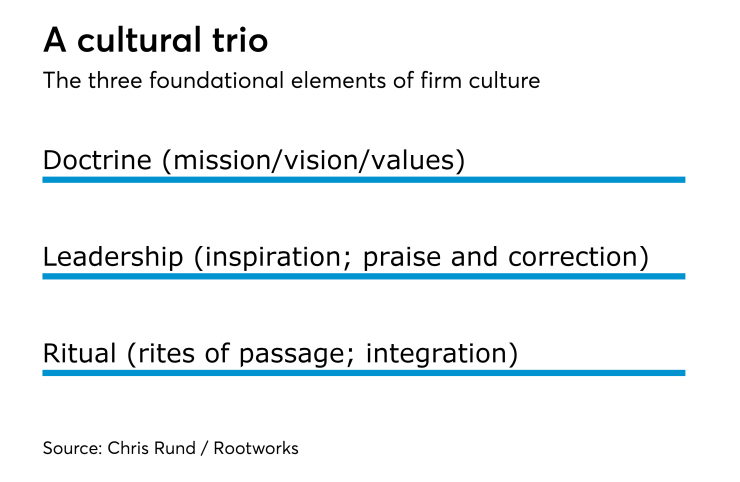Every accounting firm — every organization, for that matter, from corporations and clubs to families and groups of friends — has a culture. Most of them evolve, rather than being created; they’re an accidental accumulation of behaviors and policies that operate without conscious direction or purpose.
For a long time, this was not an issue for accounting firms. The very biggest might have consciously created and inculcated a firm culture (Arthur Andersen, for instance, was famous for making “Androids” of its employees), but most firms didn’t pay any attention to it. They might benefit from an attractive culture, or struggle with a dysfunctional one, but rarely would they make any conscious efforts to structure or change it.
Radical changes in demography and the workforce, however, have made having an attractive, consciously delineated firm culture a major asset in the war for talent and the pursuit of succession options. Firms that want to leverage that asset, however, need to do more than just adopt the current catchphrases. Here are a few ideas that are not culture — or, at best, are just the tiniest tip of the culture iceberg:
- “We treat our staff like family.” First of all, plenty of families are abusive or distant; second, while a nice thought, it’s not really applicable — you can’t fire family members, you don’t give them performance reviews, and you don’t hire them out to strangers. In this instance, Tolstoy is wrong, in that happy families (and firms) can be very different, and if you want “being a family” to be part of your firm’s culture, you need to answer some very specific questions, such as: How forgiving are you of employees’ mistakes? Will you always take an employee’s word over a client’s? How much effort and how many resources will you put into their career advancement? How much do you want to know about their personal desires and ambitions? How much do you reach out to their families, and how much do you involve them in the firm? How will you prioritize their families’ needs versus the firm’s? How hierachical is your firm? Do you expect staff to look up to you as patriarchs and matriarchs, or as cool older brothers and sisters?
- “We work hard and we play hard.” This sounds great, but means very little. Do you work 20-hour days to get projects done, and then take weeks off to make up for it? Do you allow no distractions during the work day, but make sure everyone leaves at 5? Do you play together as a firm? What do you do? Does your firm go on golf outings, or skydiving? Or do you go out for karaoke — or just for a fun dinner with drinks? What kind of people do you want to work and play with?
- “We value work-life balance.” Valuing work-life balance is not the same as empowering it. You need policies to support it, and you need to make sure managers and leaders really buy into it. More important, as with so many other common claims that firms make, leaders need to realize that this is actually a cultural choice — they shouldn’t adopt it because everyone else does, but because they really believe it. It’s entirely possible to have a firm culture that says, “We expect you to sacrifice some of your personal time” (presumably with the expectation of outsized financial rewards).
The point is that a culture that will truly differentiate your firm requires more than adopting the same broad policies and slogans as everyone else. It calls for a fair amount of self-examination and some important philosophical decisions — and then the results need to be borne in mind in every decision that follows, from whom the firm hires to whom it serves, from how it works and plays to how it lives and breathes.

For more on building a strong workplace, see "





